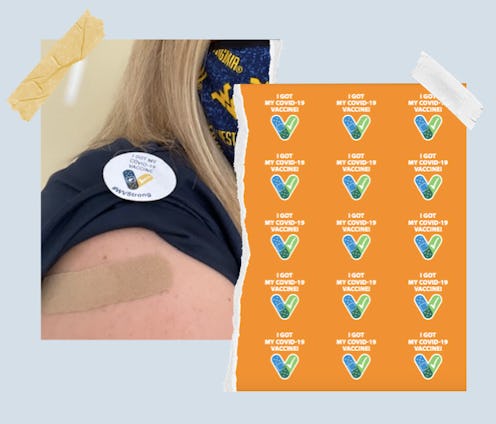Health
Who Makes The “I Got Vaccinated!” Stickers Anyway?
“When I see women I know from church in my hometown posting pictures of their stickers … I see people with a sense of hope after a really long year.”

With people still mostly stuck at home, your average selfie sparks little more recognition than a cursory double-tap. But a picture of someone’s COVID-19 vaccination record card and “I Got Vaccinated!” sticker? Pure gold.
Just as Americans have become accustomed to showing off their “I Voted!” stickers on Election Day, the march out of your nearest high school gym — or local pharmacy, or county health department, or area hospital — now comes with a similar rite of passage: proudly affixing an “I Got Vaccinated!” sticker to your jacket. The stickers are a key component of this urgent public health campaign — they spread not just joy, but also the message that vaccines are safe, accessible, and signal the end of the pandemic.
Major Holli Nelson, a member of the communications team for West Virginia’s interagency COVID task force, designed custom West Virginia stickers after seeing a version from the CDC. “‘I Voted’ stickers [show] that people were so proud to have participated in democracy,” recalls Nelson. “So we thought, ‘How about we show off being proud to be vaccinated?’” She and her colleague Dr. Lisa Costello, a pediatrician, rolled out the design in December.
For Nelson, it was critical that her state’s COVID vaccine stickers automatically identify its wearers as West Virginians. “We are a people that rally behind one another to get through the toughest of times — that’s what defines us as a state and those are the values that we carry. We really needed to include that on there so people outside of the state would know that.” She incorporated the state’s colors, blue and gold, an outline of the state map, and the #westvirginiastrong hashtag the National Guard had been using to spread COVID-related information since the pandemic’s start.
In New York City, the Department of Health took a more corporate approach, selecting a winning sticker design from concepts requested from the department’s contracted ad agencies. The stickers are just part of a suite of promotional materials, ranging from billboards to TV ads, supporting the city’s vaccination campaign. A department spokesperson tells Bustle that New Yorkers had been asking for stickers in particular: “We need our messages and excitement for the vaccine to be more contagious than the virus itself.”
Much like how “I Voted” stickers come from each state, so do vaccine administration plans, which include promotional materials like stickers. While the Centers for Disease Control and Prevention (CDC) published their own “I Got My COVID-19 Vaccine!” sticker template, it’s up to individual municipalities and vaccine-administering jurisdictions to design, print, and distribute their own stickers, which means you’re not necessarily guaranteed to get one on your vaccination day.
For West Virginia's original sticker run, rushed to ensure West Virginia state leadership could sport them after their own live TV vaccination, Nelson and Costello printed them themselves at Staples for less than $200. Even now, the two estimate that the state has spent no more than a “couple thousand dollars” on their sticker production and distribution efforts. “The cost has been minimal compared to the impact,” Nelson says of the countless sticker-bedecked vaxxies she’s seen on social media. Given West Virginia’s notably successful vaccine rollout program, stickers that make people smile feel like one small but well-earned victory lap.
In New York City, the city has invested approximately $5 million into their “NYC Vaccine for All” campaigns, which includes stickers as well as newspaper, TV, and streaming ad placements in 15 languages, the spokesperson confirms.
At least anecdotally, the investment pays off, if just in good vibes. “When I [hear] pharmacists saying, ‘Don’t forget your sticker!’ at vaccine clinics, people are so happy,” says Nelson. “The people doing the administration of the vaccine are doing so much to make people feel a part of the solution. It’s all these community partners, even at the lowest level, who really drive this home.”
Both Nelson and Costello have affixed their own stickers to their phone cases since getting vaccinated themselves, in a hope that seeing the sticker out and about will help prompt conversation in others. More than anything, they hope others seeing the stickers will help promote a very necessary morale boost after an unimaginably hard year.
“When I see women I know from church in my hometown posting pictures of their stickers getting their vaccines in the high school gym I used to play basketball in — I see people with a sense of hope after a really long year,” says Costello. “It’s a process, but we’re showing great pride in that process.”